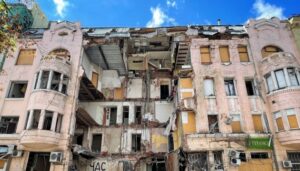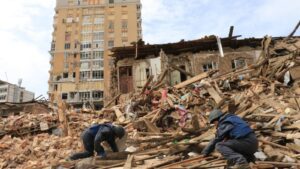
The World Bank will provide Ukraine with $232 million in compensation for minor repairs to private houses and apartments affected by the Russian invasion under the Housing and People’s Empowerment (HOPE) project.
“The HOPE project will help thousands of Ukrainian families receive funds to begin repairing their homes before winter sets in. The project will also support the Government of Ukraine in laying the groundwork for a sustainable, inclusive, and green recovery – a huge task that will take time and significant international support. The World Bank is supporting Ukraine on its path to rebuild housing and other urban infrastructure,” said Antonella Bassani, World Bank Vice President for Europe and Central Asia, as quoted in the press release.
The initial financing of the project is $232 million, of which $70 million is a loan from the International Bank for Reconstruction and Development secured by a guarantee from the Government of Japan, and $162.5 million is a grant from the multidonor Trust Fund for Supporting the Recovery and Reform of Ukraine.
The current funding will help to reimburse the costs of repairing partial damage and repairs to 98,000 individual homes and 8,000 families in 160 apartment buildings in five regions. The press release notes that the program beneficiaries will receive compensation for the repairs.
Later, additional funding of up to $800 million is expected from the World Bank and partners in the form of loan guarantees, grants and other contributions, the statement said.
“As of February 2023, the total cost of damage to Ukraine’s housing sector was estimated at more than $50 billion. This project aims to help repair approximately two-thirds of the country’s damaged residential buildings that are considered suitable for repair,” the press release said.
The project will be launched by the Ministry of Communities, Territories and Infrastructure of Ukraine (Ministry of Reconstruction).
It is noted that the HOPE project is the fourth World Bank framework project approved in Ukraine this year.
It is estimated that 1.4 million housing units have been damaged by the Russian invasion, which is 7% of the total housing stock of 3.5 million people. At the same time, 87% of the damaged housing is apartment buildings, mostly in urban areas.

The Verkhovna Rada of Ukraine has adopted in general draft law No. 7198 on the creation of a state register of housing damaged and destroyed as a result of Russia’s armed invasion of Ukraine, and the procedure for compensation for it.
The bill was supported by 275 people’s deputies at Thursday’s meeting, Yaroslav Zheleznyak, a member of the Golos faction, said in a Telegram feed.
According to the draft law, compensation will be provided only for residential property damaged or destroyed since February 24, 2022. At the same time, the law does not apply to the objects that on the date of martial law were located in the temporarily occupied territories.
Owners of apartments and other residential premises will be able to receive a housing certificate confirming guarantees of the state to finance the purchase of housing (including those built in the future) within a certain amount, while owners of private houses will have a choice between receiving a certificate and monetary compensation. Such monetary compensation will be accrued in a special regime to finance construction.
The bill does not set a limit on the amount of compensation, as well as limits on the location, type and size of new housing financed by the certificate. At the same time, if the cost of housing will be lower than the amount specified in the certificate, the balance of compensation will be paid only at the expense of funds received from the Russian Federation for the reimbursement of damages.
The term for applying for compensation is during martial law and within one year after its cancellation. It is possible to use the certificate within five years from the date of its issue, and it is prohibited to alienate housing (except inheritance) for five years.
The applications will be considered by the commissions for consideration of compensation established by the executive bodies of local councils, military or civilian-military administrations.
According to the draft law, sources of financing of compensations can be state and local budgets; funds from international financial organizations, creditors and investors; international technical and/or refundable or non-refundable financial aid; reparations or other recoveries from Russia and others.
As reported, Ukrainians have already submitted more than 325,000 reports of destruction or damage to housing through Diya